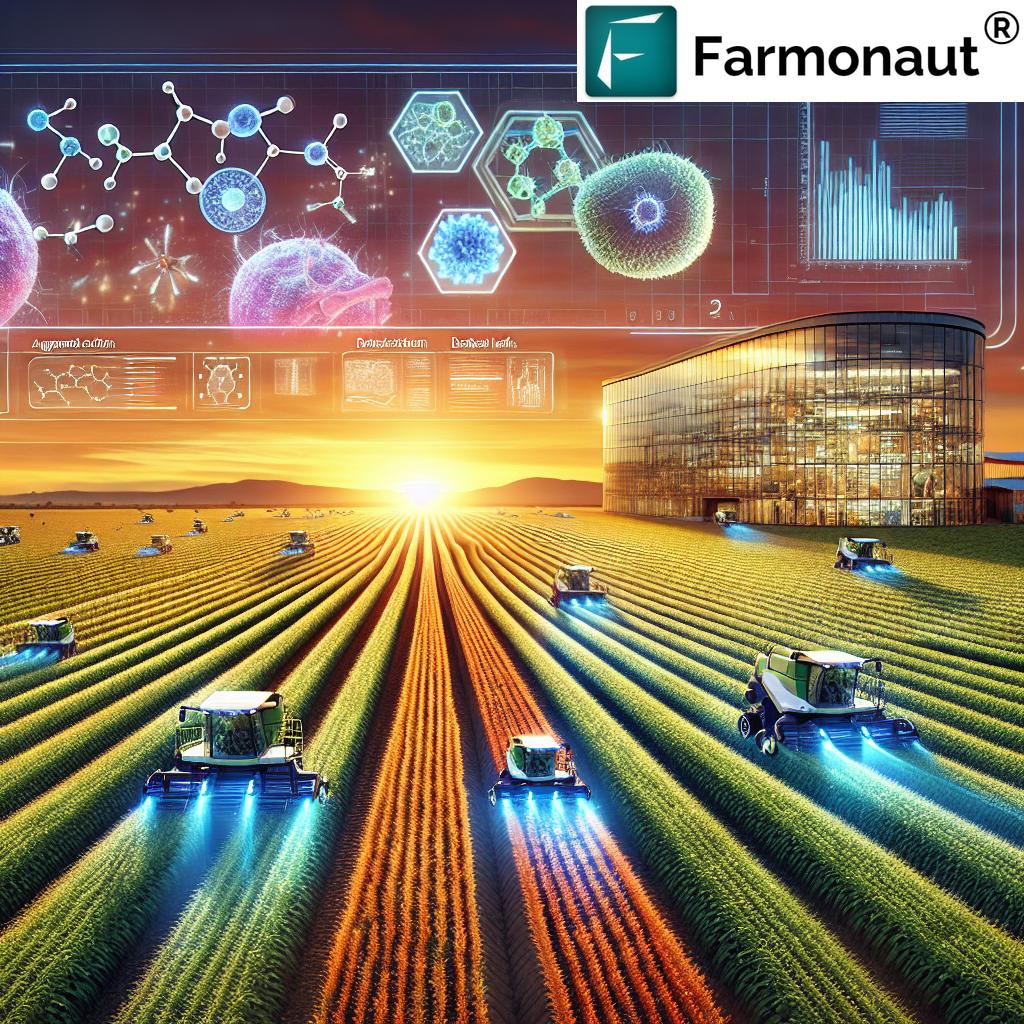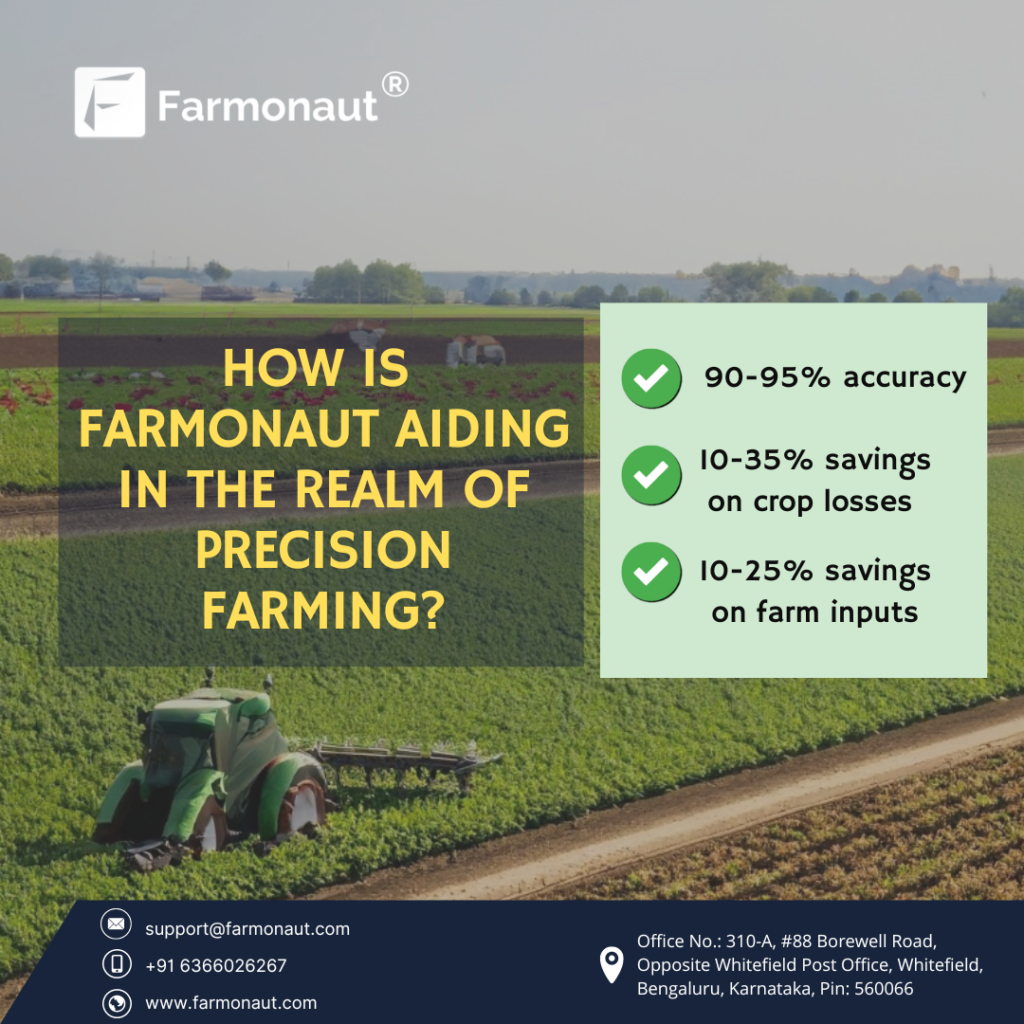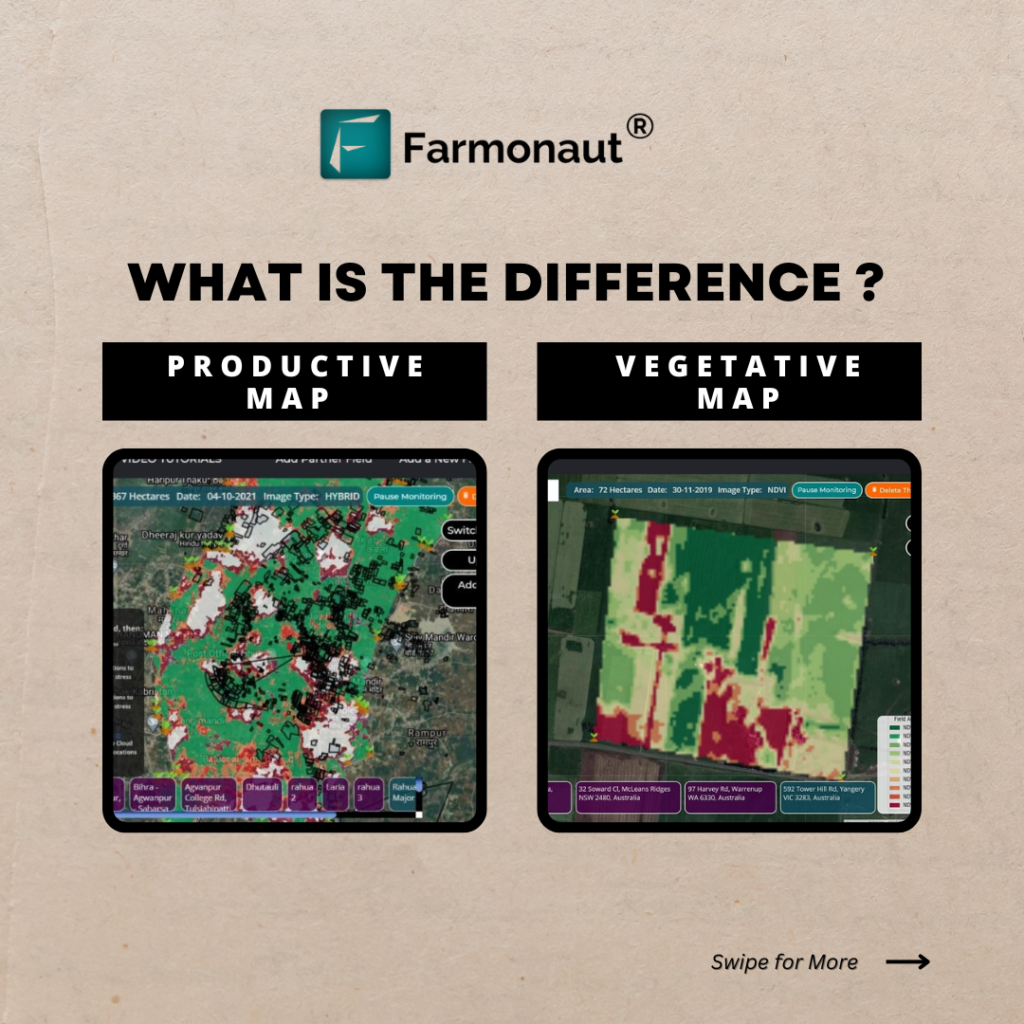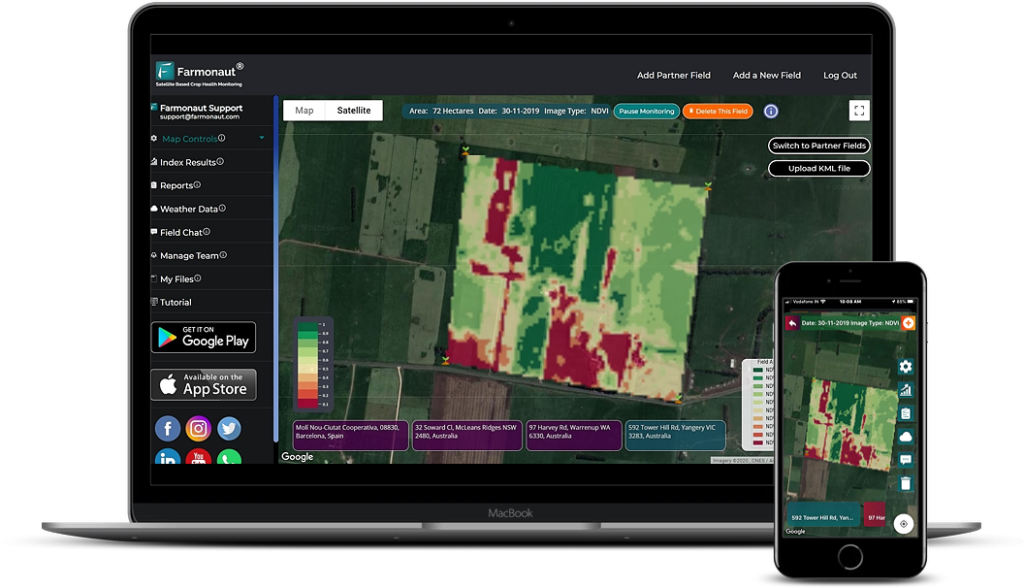AgTech Revolution: Genetically Engineered Probiotics Secure $12M Funding, Driving Innovation in Precision Agriculture
“A recent Series A funding round secured $12 million for genetically engineered probiotics, highlighting AgTech’s growing potential.”
In the ever-evolving landscape of agricultural technology, we’re witnessing a remarkable surge in innovation and investment. Today, we’re excited to delve into a groundbreaking development that’s set to revolutionize the agtech industry: a $12 million Series A funding round for genetically engineered probiotics. This significant investment not only underscores the growing interest in precision agriculture but also highlights the potential of agricultural biotechnology to transform our approach to farming and food production.
At Farmonaut, we’re at the forefront of agricultural innovation, providing cutting-edge satellite-based farm management solutions. While our focus is on leveraging satellite technology and AI to enhance farming practices, we recognize the importance of staying informed about all aspects of agtech advancement. The recent funding in genetically engineered probiotics represents a fascinating intersection of biotechnology and agriculture that could have far-reaching implications for the industry.

The Rise of Genetically Engineered Probiotics in AgTech
The recent $12 million funding for genetically engineered probiotics marks a significant milestone in the agtech and foodtech industries. This investment reflects a growing trend towards leveraging advanced biotechnology to address various challenges in agriculture and human health. Let’s explore the implications of this development and how it fits into the broader context of agricultural innovation.
- Precision Agriculture Enhancement: Genetically engineered probiotics have the potential to revolutionize precision agriculture by offering targeted solutions for crop health and soil management.
- Gut Health Advancements: The research focuses on creating novel probiotic products that address various health concerns, from hangover relief to improving gut microbial diversity.
- Biotechnology Integration: This funding highlights the growing acceptance of genetic engineering in agriculture, paving the way for more innovative approaches to farming practices.
As we at Farmonaut continue to provide state-of-the-art satellite-based solutions for farm management, we’re excited to see how these biotechnological advancements will complement our services. Our web app and mobile applications for Android and iOS platforms are designed to work in harmony with various agtech innovations, providing farmers with comprehensive tools for modern agriculture.
The Global AgTech Landscape: A Surge in Funding and Innovation
“The global AgTech market is experiencing increased capital flow, particularly in North America and Europe, driving agricultural innovation.”
The $12 million investment in genetically engineered probiotics is just one example of the broader trend of increased funding in the agtech sector. This surge in capital is particularly noticeable in North America and Europe, but its impact is global. Let’s take a closer look at the current state of agtech funding and its implications for the future of agriculture.
Key Regions Driving AgTech Investment
- North America: Leading the charge in agtech funding, with a focus on precision agriculture and biotechnology.
- Europe: Seeing significant growth in agtech investments, particularly in sustainable farming practices.
- Asia: Emerging as a key player in agtech, with a focus on addressing food security challenges.
- Australia: Making strides in drought-resistant technologies and sustainable farming practices.
- Middle East and Africa: Increasing investments in agtech to combat harsh climatic conditions and improve food production.
This global distribution of agtech funding is creating a diverse and innovative landscape for agricultural technology. At Farmonaut, we’re proud to be part of this global movement, offering our satellite-based solutions to farmers worldwide. Our API allows developers and businesses to integrate our satellite and weather data into their own systems, further contributing to the global agtech ecosystem.
Genetically Engineered Probiotics: A Game-Changer in Agriculture
The recent $12 million funding for genetically engineered probiotics represents a significant leap forward in agricultural biotechnology. This innovative approach has the potential to address various challenges in farming and food production. Let’s explore how these probiotics are poised to revolutionize agriculture:
- Enhanced Crop Resilience: Genetically engineered probiotics can improve plants’ ability to withstand environmental stresses, potentially increasing crop yields.
- Soil Health Improvement: These probiotics can enhance soil microbial diversity, leading to better nutrient uptake and overall soil health.
- Reduced Chemical Inputs: By promoting natural plant defenses, these probiotics could reduce the need for chemical pesticides and fertilizers.
- Sustainable Farming Practices: The use of genetically engineered probiotics aligns with the growing demand for sustainable and eco-friendly farming methods.
While Farmonaut specializes in satellite-based farm management, we recognize the importance of these biotechnological advancements in shaping the future of agriculture. Our API Developer Docs provide information on how our satellite data can be integrated with other agtech solutions, potentially including applications related to genetically engineered probiotics.

The Intersection of Probiotics and Precision Agriculture
The convergence of genetically engineered probiotics and precision agriculture represents a new frontier in farming technology. This intersection has the potential to create highly targeted and efficient farming practices. Here’s how these two fields are coming together:
- Data-Driven Probiotic Application: Precision agriculture tools, like those offered by Farmonaut, can help farmers determine the optimal time and location for applying probiotic treatments.
- Customized Soil Solutions: By combining soil health data from satellite imagery with probiotic technology, farmers can develop tailored solutions for different areas of their fields.
- Enhanced Crop Monitoring: The effects of probiotic treatments can be closely monitored using precision agriculture tools, allowing for real-time adjustments and optimization.
- Integrated Pest Management: Genetically engineered probiotics could play a role in biological pest control, which can be more precisely applied using data from precision agriculture systems.
At Farmonaut, we’re excited about the potential synergies between our satellite-based farm management solutions and these emerging biotechnologies. While we don’t directly work with probiotics, our tools can provide valuable data to support their effective use in precision agriculture.
AgTech Funding Comparison: A Closer Look at Recent Investments
To put the $12 million funding for genetically engineered probiotics into perspective, let’s examine how it compares to other recent investments in the agtech sector. This comparison will help illustrate the diverse range of technologies attracting investment in agriculture.
| Company Name | Funding Amount | Funding Round | Primary Focus Area | Potential Impact on Agriculture |
|---|---|---|---|---|
| ProBiotic Agri (Hypothetical) | $12 Million | Series A | Genetically Engineered Probiotics | Enhanced crop resilience, improved soil health |
| AgroTech Solutions | $20 Million | Series B | AI-Powered Crop Management | Optimized resource use, increased yields |
| GreenFarm Innovations | $8 Million | Series A | Vertical Farming Technology | Urban agriculture expansion, reduced water usage |
| BioSeed Genetics | $15 Million | Series B | Drought-Resistant Crop Varieties | Improved crop survival in arid regions |
| AgriDrone Systems | $10 Million | Series A | Drone-Based Crop Monitoring | Enhanced precision in pest and disease management |
This table illustrates the diverse range of technologies attracting significant investment in the agtech sector. While the $12 million for genetically engineered probiotics is substantial, it’s part of a broader trend of funding flowing into various innovative agricultural technologies.
The Role of Genetic Engineering in Modern Agriculture
Genetic engineering in agriculture has come a long way since its inception, and its acceptance is growing as we recognize its potential to address critical challenges in food production and sustainability. The recent funding for genetically engineered probiotics is a testament to this trend. Let’s explore the current state and future prospects of genetic engineering in agriculture:
- Crop Improvement: Genetic engineering allows for the development of crops with enhanced nutritional profiles, improved pest resistance, and better adaptability to climate change.
- Sustainable Farming: Genetically modified crops can require fewer pesticides and water, contributing to more sustainable farming practices.
- Food Security: By creating crops that can thrive in challenging environments, genetic engineering plays a crucial role in addressing global food security concerns.
- Precision Breeding: Advanced genetic engineering techniques like CRISPR allow for more precise and efficient crop breeding.
While Farmonaut’s focus is on satellite-based farm management, we recognize the importance of genetic engineering in shaping the future of agriculture. Our tools can provide valuable data to support the development and implementation of genetically engineered crops and probiotics.
The Future of AgTech: Trends and Predictions
As we look to the future of agricultural technology, several trends are emerging that will shape the industry in the coming years. The recent investment in genetically engineered probiotics is just one part of this evolving landscape. Here are some key trends and predictions:
- AI and Machine Learning: Increased use of AI for predictive analytics in farming, improving decision-making and resource management.
- Blockchain in Agriculture: Growing adoption of blockchain technology for supply chain transparency and traceability.
- Vertical and Urban Farming: Expansion of vertical farming technologies to address urbanization and land scarcity issues.
- Precision Agriculture: Continued growth in precision farming techniques, leveraging data from various sources including satellites and IoT devices.
- Sustainable Ag-Tech: Increased focus on technologies that promote sustainable farming practices and reduce environmental impact.
At Farmonaut, we’re committed to staying at the forefront of these trends. Our satellite-based solutions and AI-powered analytics are continuously evolving to meet the changing needs of modern agriculture. We invite you to explore our web app and mobile applications for Android and iOS to see how we’re contributing to the future of agtech.
The Global Impact of AgTech Advancements
The advancements in agricultural technology, including the recent funding for genetically engineered probiotics, have far-reaching implications for global agriculture. Let’s examine how these innovations are impacting different regions:
- North America: Leading in precision agriculture adoption, with a focus on large-scale farming efficiency.
- Europe: Emphasizing sustainable farming practices and organic agriculture technology.
- Asia: Rapidly adopting agtech to address food security challenges in densely populated areas.
- Africa: Leveraging mobile technology and AI to provide farming advice and improve smallholder productivity.
- Australia: Focusing on drought-resistant technologies and water-efficient farming methods.
- South America: Adopting precision agriculture for large-scale soybean and corn production.
Farmonaut’s global reach allows us to contribute to agricultural advancements across these diverse regions. Our satellite-based solutions are adaptable to various farming contexts, from small subsistence farms to large commercial operations.
The Role of Data in Modern Agriculture
In the age of agtech, data has become a crucial component of modern farming practices. The integration of genetically engineered probiotics with precision agriculture highlights the importance of data-driven decision-making in farming. Here’s how data is transforming agriculture:
- Precision Farming: Satellite imagery and IoT sensors provide real-time data on crop health, soil conditions, and weather patterns.
- Predictive Analytics: AI and machine learning algorithms analyze historical and real-time data to predict crop yields and potential issues.
- Resource Optimization: Data-driven insights help farmers optimize the use of water, fertilizers, and pesticides.
- Supply Chain Management: Data analytics improve traceability and efficiency in agricultural supply chains.
At Farmonaut, we specialize in providing farmers with actionable data through our satellite-based farm management solutions. Our API allows for seamless integration of our data with other agtech tools, enhancing the overall data ecosystem in agriculture.
Challenges and Opportunities in AgTech Adoption
While the agtech sector is experiencing rapid growth and innovation, there are still challenges to widespread adoption. Understanding these challenges is crucial for continued progress in the industry:
- Technology Access: Ensuring that small and medium-sized farms have access to advanced agtech solutions.
- Digital Literacy: Addressing the need for training and education to help farmers effectively use new technologies.
- Data Privacy and Security: Protecting sensitive farm data while leveraging its benefits for improved agriculture.
- Integration of Technologies: Ensuring different agtech solutions can work together seamlessly for maximum benefit.
- Regulatory Frameworks: Developing appropriate regulations for new technologies like genetically engineered probiotics.
These challenges also present opportunities for innovation and collaboration within the agtech industry. At Farmonaut, we’re committed to addressing these challenges by providing user-friendly, accessible solutions and robust data security measures.
The Future of Food: AgTech’s Role in Ensuring Global Food Security
As the global population continues to grow, ensuring food security becomes increasingly crucial. AgTech innovations, including genetically engineered probiotics and precision agriculture, play a vital role in addressing this challenge. Here’s how agtech is shaping the future of food production:
- Increased Crop Yields: Advanced farming techniques and genetically improved crops can significantly boost production.
- Resilient Agriculture: Technologies that help crops withstand climate change and extreme weather events.
- Reduced Food Waste: Improved supply chain management and storage solutions to minimize post-harvest losses.
- Sustainable Farming: Agtech solutions that promote environmentally friendly farming practices.
- Diverse Food Sources: Innovations in alternative protein sources and vertical farming to diversify food production.
Farmonaut’s satellite-based solutions contribute to this effort by providing farmers with the data and insights they need to optimize their crop production and resource use. Our commitment to making precision agriculture accessible aligns with the broader goal of ensuring global food security.
Conclusion: Embracing the AgTech Revolution
The $12 million funding for genetically engineered probiotics is a clear indicator of the exciting developments happening in the agtech sector. As we’ve explored throughout this article, this investment is part of a broader trend of innovation and funding in agricultural technology. From precision agriculture to genetic engineering, the future of farming is being shaped by these advancements.
At Farmonaut, we’re proud to be part of this agtech revolution. While our focus is on providing satellite-based farm management solutions, we recognize the importance of diverse technologies in advancing agriculture. Our tools complement other agtech innovations, contributing to a more efficient, sustainable, and productive agricultural sector.
As we look to the future, it’s clear that the integration of various agtech solutions will be key to addressing global challenges in food production and sustainability. We encourage farmers, agribusinesses, and tech enthusiasts to stay informed about these developments and explore how they can leverage agtech in their operations.
To learn more about how Farmonaut’s satellite-based solutions can enhance your farming practices, visit our web app or download our mobile applications for Android and iOS. Together, we can embrace the agtech revolution and shape a more sustainable and productive future for agriculture.
Farmonaut Subscriptions
Frequently Asked Questions (FAQ)
- What are genetically engineered probiotics?
Genetically engineered probiotics are beneficial microorganisms that have been modified at the genetic level to enhance their properties or introduce new beneficial traits for agricultural or health applications. - How does the recent $12 million funding impact the agtech industry?
This funding signifies growing investor confidence in agricultural biotechnology and could accelerate research and development in the field of genetically engineered probiotics for agriculture. - What is precision agriculture?
Precision agriculture is a farming management concept that uses technology to observe, measure, and respond to inter and intra-field variability in crops, optimizing returns on inputs while preserving resources. - How does Farmonaut contribute to precision agriculture?
Farmonaut provides satellite-based farm management solutions that offer real-time data on crop health, soil conditions, and weather patterns, enabling farmers to make informed decisions and optimize their farming practices. - What are the potential benefits of genetically engineered probiotics in agriculture?
These probiotics could enhance crop resilience, improve soil health, reduce the need for chemical inputs, and contribute to more sustainable farming practices. - How is agtech funding distributed globally?
While North America and Europe are leading in agtech investments, there’s growing interest and funding in Asia, Australia, and other regions, each focusing on technologies relevant to their specific agricultural challenges. - What role does genetic engineering play in modern agriculture?
Genetic engineering in agriculture contributes to crop improvement, sustainable farming practices, enhanced food security, and more precise breeding techniques. - How can farmers access Farmonaut’s services?
Farmers can access Farmonaut’s services through our web app, Android app, and iOS app. We also offer API access for developers and businesses looking to integrate our data into their systems. - What are the main challenges in agtech adoption?
Key challenges include technology access for small farms, digital literacy among farmers, data privacy concerns, integration of different technologies, and developing appropriate regulatory frameworks. - How is agtech contributing to global food security?
Agtech contributes to food security by increasing crop yields, creating more resilient agricultural systems, reducing food waste, promoting sustainable farming practices, and diversifying food sources.
We hope this FAQ section helps address some of the common questions about the recent developments in agtech and Farmonaut’s role in the industry. For more specific questions about our services, please don’t hesitate to contact us directly.












